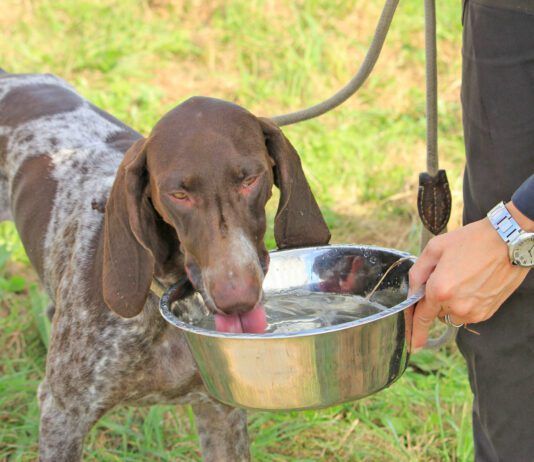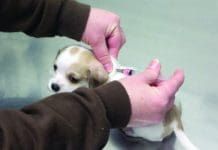Parvovirus in Dogs: What It Is and How to Prevent It
Because Canine Parvovirus can be found anywhere infected dogs have visited, the cornerstone to protecting your dog from the parvovirus is vaccination. Since the development of the parvo vaccine, the incidence of infection has been greatly reduced. A single modified live vaccine can confer protection within three to five days. Although parvoviruses continue to evolve, vaccination appears to confer reliable protection against all known strains.
10 Weight Loss Tips for Senior Dogs
Older dogs, like older people, have an easier time getting around if they aren't overweight. Losing weight can be a challenge for dogs at any age, but more so as dogs grow older. Still, weight loss for dogs is worth the effort. Slender dogs not only get around more easily, but also actually live longer. A 14-year study showed that dogs fed 25 percent fewer calories than their free-fed littermates lived nearly two years longer, showed fewer visible signs of aging, and enjoyed an extra three years of pain-free mobility before developing canine arthritis.
The Many Causes of Kennel Cough
Dogs with the uncomplicated form of kennel cough tend to be otherwise healthy and continue to eat, drink, and play. Their lungs will usually sound normal, but some may experience lethargy and have a slight fever like my young pup. Others may experience nasal discharge and sneezing; still others exhibit only a persistent cough sometimes dry and hacking, or soft and wet. Excitement, exercise, and changes in temperature or humidity can induce coughing, as can gentle pressure on the trachea, such as from a collar.
Canine Parvovirus Vaccine, Symptoms, and Treatment
How is parvo spread among dogs? Whole Dog Journal discusses a number of canine parvovirus prevention and treatment approaches taken by veterinarians and dog guardians today. Reactions to parvovirus vary widely. In a world where parvovirus is literally everywhere, parvo kills some dogs and leaves others unscathed. And in the debate about parvo vaccination, some people vaccinate their dogs early and often, while others refuse to vaccinate against parvo at all.
Aromatherapy for Your Dog’s Arthritis Treatment
Each essential oil has a chemical category that may have several different effects. Aromatherapy is a modern healing art, and the therapeutic quality of essential oils is still being discovered. In other words, aromatherapy is a complex subject that deserves careful study and expert guidance. There are many ways to deliver essential oils into your dog's environment. Essential oils the volatile substances of aromatic plants are collected, usually by steam distillation, from leaves, blossoms, fruit, stems, roots, bark, or seeds. The water that accompanies an essential oil during distillation is called a hydrosol or flower water. Hydrosols contain trace amounts of essential oil and are themselves therapeutic.
Treating Your Dog’s Hypothyroidism
Hypothyroidism (underactive or low thyroid) is a common disorder in dogs. A variety of breeds are known to be genetically predisposed, including the Labrador Retriever, Golden Retriever, Dachshund, Boxer, Doberman, and Cocker Spaniel. (It's normal for sighthounds such as the Greyhound to have relatively low thyroid levels as a result of their unique physiology; these levels are not a sign of pathology in these breeds.)
Kennel Cough Resources
These products and informational resources on the bordetella virus are meant to help you alleviate your dog's symptoms of kennel cough. For more information on kennel cough from Whole Dog Journal, see Kennel Cough: Treatment, Symptoms, Prevention.
Herbal Remedies for Your Dog’s Arthritis Pain
While its true that some herbs recommended for use with canine arthritis have drug-like actions, including contraindications and potentially adverse side effects, the plants mentioned here are easily acquired from reputable sources, widely used, and safe for most dogs. The descriptions that follow include safety notes as applicable.
Identifying Arthritis in Dogs
There are a number of types of arthritis that affect dogs: osteoarthritis, rheumatoid arthritis, septic or infective arthritis, spinal stenosis, spondylitis and spondylosis. Conventional medicine considers arthritis in dogs and humans a chronic disease that progresses and has no cure but which can be managed with symptom-suppressing drugs and other therapies. Holistic veterinarians manage arthritis in dogs with diet, nutritional supplements, medicinal herbs, and a variety of noninvasive treatments, many of which dog lovers can provide at home.
Puppy Vaccines: Why Your Puppy Needs So Many Shots
Puppy vaccine schedules can be daunting to new dog owners. Why do puppies need so many shots? Are all those puppy vaccinations really necessary? Most veterinarians recommend that puppies are vaccinated for distemper, parvovirus, and adenovirus (hepatitis) a number of times, starting when they are about four to six weeks old, and again every three or four weeks, with their last puppy vaccination" given after they are about 16 to 20 weeks old. "
The Dog is Throwing Up!: Your Guide to Dog Vomiting
When dogs feel nauseated and are about to throw up, they often drool, lick their lips, swallow excessively, and stand head down looking worried. Many dogs look for or turn to their owners when they're about to vomit, which can signal alert caregivers to move their pets to a better location! In time you might be able to train your dog to throw up where it does the least damage.
Retained Testicles Can Be Dangerous for Dogs
How does it happen that testicular descent fails to occur in some cases? As the canine fetus develops, the testicles are formed in the abdomen, near the kidneys. Usually, as the puppy grows initially, in utero, and then, after his birth his testicles are gradually pulled from the abdomen, through the inguinal canal (a passageway through the abdominal wall), and into the scrotum by the gubernaculum, a ligamentous cord connecting the testes to the scrotum.














